|
Years ago while visiting with my Mom one day, I related to her
some hair-brained thing that a group of people had suggested I do.
"They must think my Momma dropped me on my head when
I was a baby!" I said, sarcastically dismissing their idea as ridiculous.
Mom smiled, cleared her throat and began, "Well, actually…"
Frozen in my tracks, I listened wide-eyed as she detailed how in
1947 when she was pregnant with me, she took a nasty fall while
descending a flight of stairs. Landing hard on her abdomen, she
spent the remainder of her term worried sick that I would arrive
bearing a permanent physical or mental defect caused by impact
trauma. Luckily for me, five years after uncurling from the fetal
position I was rod and reel fishing, which I suppose in her mind
laid to rest both those worries (while doubtless provoking fresh
ones).
So how come, with fifty-six years of fishing experience behind me,
do I still sometimes go fishing when adverse weather and water
conditions practically shout, "STAY HOME, DUMMY!" And it's
not just me out there, either: we all do it from time to time. Why?
I would not presume to explain anyone else's motives, but here's
my answer: It's because my Momma dropped me on my head
when I was a baby.
It's Sunday, October 26th. The night before, prior to turning in, I
checked the on-line National Weather Service forecast for Lawrence
and saw the words: "North wind 15-to-20 with gusts to 30 mph."
At dawn Sunday I checked again and, oh boy: "North wind
20-to-30 with gusts to 40 mph."
A trip this morning would be possible, but tricky. When hit by
a high north wind this lake offers but a few protected spots where
I can launch my canoe and operate safely. Compounding the trip's
trickiness was rain we'd gotten three days earlier. A cold front had
taken up residence and the trees and plants surrounding the lake
were going dormant, not sucking as much water from the ground.
I was certain the lake would still be turbid from that recent surface
runoff.
In the face of so many environmental handicaps, what sold me
on the idea of going out? Easy: I knew I would have the whole
lake to myself. On a chilly morning (36-degrees) with the promise
of high wind and mud-stained water, only people whose mothers
dropped them on their heads when they were babies would be fishing.
At 8:30 a.m. my pickup rolled up to the crest of the lake dam, I
turned left after the stop sign, glanced down at the water and was
stunned by what I saw. It looked like some kind of Bass Boat
Demonstration Derby was in progress. No less than seven bass
boats were spaced out in the small lake arm I wanted to fish. More
were floating in the lake's main body and along the face of the dam.
Never before have I seen so many bass boats on this small lake at
one time. What in the world is this? Fall crappie fishermen maybe?
Had the crappies started schooling and word had spread that this lake
is red hot right now?
No way of knowing what's going on here without asking somebody
who's involved. After parking at my canoe launching spot, I stepped
out of my truck and struck up a conversation with a guy sitting in the
bow of a bass boat that was slowly trolling parallel to the bank. Two
teenage boys were casting plastic worms inches from the shoreline at
the exact spot where I wanted to launch. Oh well; so much for that
idea…
The man explained; they were having a youth bass fishing tournament.
Each boat I saw carried two teenage contestants, plus one adult
non-fishing passenger who served as official tournament umpire/observer
(exactly how these events work, I don't know).
Bass tournament, huh? In a way, it was good news. If luck would
have it that I enjoyed a hot streak on bluegills, red ear sunfish or
crappies this morning, my panfishing success would for all practical
purposes be invisible to this armada. They would remain focused
on catching nothing but largemouth bass.
"Me, I'm just here after some bluegills," I told the guy in the boat.
"But hey, if you guys are after bass, is it legal within your tournament
rules for me to tell you where I caught a nice bass a couple of weeks
ago?"
"Yes, that's allowed."
"Okay, then keep fishing your way down this shoreline. About
100 yards down you'll see a stump poking out of the water, close
to shore? I caught and released a nice bass there two weeks ago,
it pushed 2-pounds; I was using a foam spider. But it was almost
dusk, the air was much warmer, there was no wind and the water
was clearer than it is today."
"Thanks," he said. "Hey, if you like bluegills you should run over
to…" and proceeded to clue me about a lake in Missouri that has
bluegills so big and numerous that, "…even bass fishermen go there
just to target the 'gills."
As a general rule I disagree with the philosophy that underpins
bass fishing tournaments. In my opinion, "competition fishing" is
a contradiction in terms. And I am disgusted by the garish
spectacles you see on TV – none more odious than the weigh-in
ceremonies where screaming, leaping, teeth-baring, fist-pumping
contestants wearing jumpsuits festooned with sponsor patches look
and behave like – I don't know – like NASCAR drivers tripping on
methamphetamine?
But if this group of young contestants fishing the lake were offering
a glimpse of changes happening in bass fishing, there's hope for a
better tomorrow. Those kids were quiet; they spoke softly at all
times, no boat-to-boat shouting. As their bass boats moved past
me one by one like a WWII Battleship Row re-enactment, I would
occasionally hear the adult on board quietly instruct the boy manning
the trolling motor to give my anchored canoe a wide berth. Each
passing team I briefly visited with was polite. There was no racing
of powerboats from spot to spot, and at no time did any of the
contestants crowd another's fishing space. More than just fishing
tactics were being practiced here: the adults on board were tutoring
these boys in navigation etiquette, sportsmanship and self-control.
I've never been around a group of powerboats and felt so safe. It
was nice.
There is nothing like a Fly Anglers On Line decal adorning the
side of my canoe, nor was I wearing the FAOL ball cap I
bought this spring from Betty Hiner. Good thing I wasn't
"flying the flag" because no sooner did I launch my canoe
than that north wind arrived as promised, after which I put
on a fly casting exhibition so hapless that any teenage contestant
who watched me left the lake promising to himself that he will never,
ever try a fly rod.
Almost from my first cast, this is the sort of disaster that kept happening:
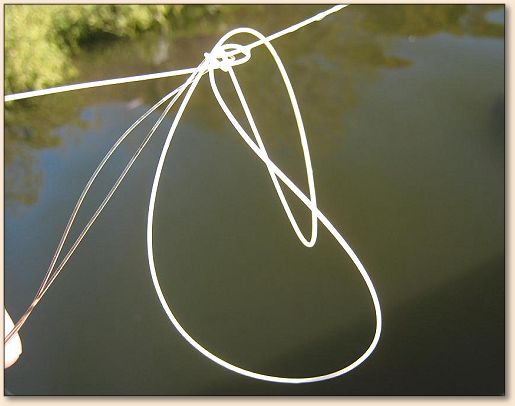
What is THIS!
When my casting goes haywire, innocent bystanders best run
for their lives. Some of my line snarls brought to mind the notorious
"Hatchet Knot" that my Navy buddy, Dewey Barras, told me about
back when he and I were Fly 2 blue shirts working the flight deck of
the aircraft carrier USS Ticonderoga. (And what is a Hatchet Knot,
you ask? It's any knot so tight that the only way you can untie it is to
chop it apart with a hatchet.)
And if it wasn't some ugliness involving an off-rod segment of floating
line, bizarre things like the below would happen:
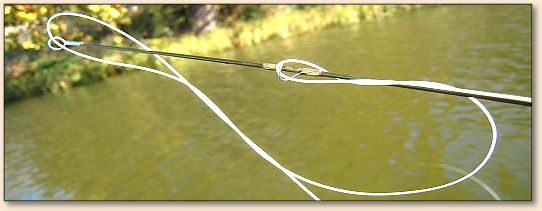 And this, too!
And this, too!
I'm still trying to figure out how a simple line pickup/one-stroke
backcast/one-stroke forward cast results in a tip-top guide
catastrophe such as the one pictured above.
After two hours of dealing with these and other casting horrors
while maneuvering my canoe in wind that alternated between
swirling, straight and hard, or almost dead calm, the realization
hit me that not a single fish had touched my fly pattern all morning.
Indeed, nothing at all had touched my nymph – not aquatic plant
nor submerged stump, not any of the shoreline weeds, not even
an overhanging branch. Were it not for the irksome chore of
unraveling wind knots and other nightmarish tangles caused by
my casting errors, I might have been a research volunteer floating
in a sensory deprivation tank.
Finally, following a roll cast made downwind into a shoreline
pocket, there came a hookup. I know, I know: it was only a
submerged branch. But I was in no mood to fussily insist on
hooking an actual fish: it felt too good, the sensation of resistance
in my right hand and the sight of a bent rod? For all you novice
fly fishers out there who have not yet snagged a nymph on a
submerged stick, here's what it looks like:
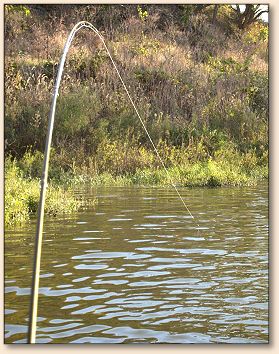
Stick fish on!
In the photo, observe if you will how the bent rod/tight line
configuration replicates exactly what your rod will look like
when a wild fish is on the end of your line? Be advised, though,
that unlike a real fish the stick does not move. Unless by some
miracle it snaps off, you can't reel it in; no, you must somehow
move your boat over to where the stick is then try to wiggle your
nymph loose from it so that you can resume fishing. Pay attention,
class; this might be a question on next's week's snap quiz.
Sometime around the third hour I made one of the morning's
precious few decent casts. It was a "reverse cast", a type we
boat fishers often use. It starts with you facing forward in your
boat, false-casting enough line to make a forward cast. At the
last second, instead of throwing a normal forward cast you release
on the backcast stroke, letting your line fly astern over your shoulder?
In this case the cast delivered my nymph thirty feet behind me and
a couple feet out from the edge of a subtle weedy protrusion. A
few seconds into a slow strip retrieve came a hard hit from a very
real, extremely irate 10-inch red ear sunfish.
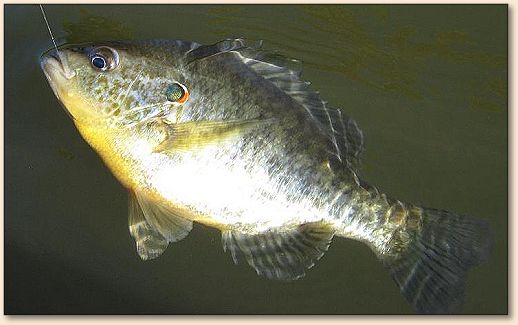
Mr. Red Ear
I targeted the spot again. Two reverse casts later a 7-inch red ear
sunfish torpedoed Old Reliable. Hey, now; maybe I'm in business!
But no such luck; another thirty minutes ticked away without another
hit along that shoreline, all the while the chilly north wind was steadily
building to worrisome velocity. It was time to get off the lake. Lifting
my floating fish basket out of the water, an inward push on its lower
trapdoor freed the two red ears and I paddled for shore.
Wouldn't it be fun to connect with that big red ear again, maybe
next fall when he might be an inch or so longer, a few ounces heavier
and even meaner? ~ Joe
About Joe:
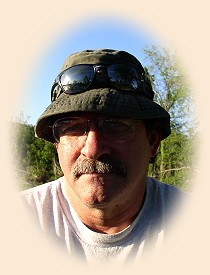 From Douglas County, Kansas, Joe is a former municipal and
federal police officer, now retired. In addition to fishing, he hunts
upland birds and waterfowl, and for the last 15 years
has pursued the sport of solo canoeing. On the nearby
Kansas River he has now logged nearly 5,000 river miles
while doing some 400 wilderness style canoe camping
trips. A musician/singer/songwriter as well, Joe recently
retired from the U.S. General Services Adminstration.
From Douglas County, Kansas, Joe is a former municipal and
federal police officer, now retired. In addition to fishing, he hunts
upland birds and waterfowl, and for the last 15 years
has pursued the sport of solo canoeing. On the nearby
Kansas River he has now logged nearly 5,000 river miles
while doing some 400 wilderness style canoe camping
trips. A musician/singer/songwriter as well, Joe recently
retired from the U.S. General Services Adminstration.
Joe at one time was a freelance photojournalist who wrote the
Sunday Outdoors column for his city newspaper. Outdoor
sports, writing and music have never earned him any money,
but remain priceless activities essential to surviving the
former 'day job.'
|


 And this, too!
And this, too!

 From Douglas County, Kansas, Joe is a former municipal and
federal police officer, now retired. In addition to fishing, he hunts
upland birds and waterfowl, and for the last 15 years
has pursued the sport of solo canoeing. On the nearby
Kansas River he has now logged nearly 5,000 river miles
while doing some 400 wilderness style canoe camping
trips. A musician/singer/songwriter as well, Joe recently
retired from the U.S. General Services Adminstration.
From Douglas County, Kansas, Joe is a former municipal and
federal police officer, now retired. In addition to fishing, he hunts
upland birds and waterfowl, and for the last 15 years
has pursued the sport of solo canoeing. On the nearby
Kansas River he has now logged nearly 5,000 river miles
while doing some 400 wilderness style canoe camping
trips. A musician/singer/songwriter as well, Joe recently
retired from the U.S. General Services Adminstration.